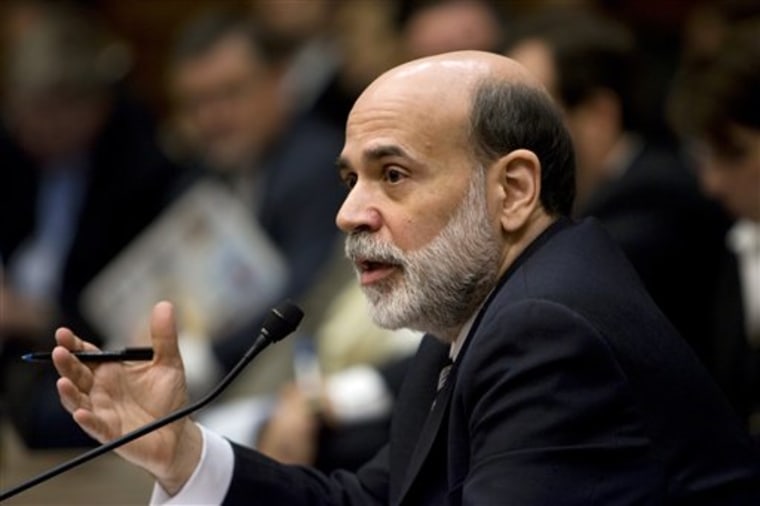Federal Reserve Chairman Ben Bernanke told Congress Thursday that the U.S. is "not anywhere near" the dangerous stagflation situation that prevailed in the 1970s.
With the economy slowing and inflation rising, fears have grown that the country could be headed for the dreaded twin evils of stagnant growth and rising prices known as "stagflation."
"I don't anticipate stagflation," Bernanke told the Senate Banking Committee.
Still, high energy prices and rising inflation do complicate the Fed's job of trying to keep the economy growing and inflation contained, Bernanke acknowledged.
High energy prices are creating "inflationary stress," Bernanke said. And, that is "complicating" the Fed's work in terms of shoring up the economy, the Fed chief said.
President George W. Bush, at a news conference Thursday, noted the slow economic growth but said the nation isn't headed into a recession.
He rejected calls for additional stimulus efforts, instead advising patience. "Why don't we let stimulus package one, which seemed like a good idea at the time, have a chance to kick in?" Bush said at the White House.
Bernanke's testimony in the Senate caps back-to-back appearances on Capitol Hill that started in the House on Wednesday. The Fed chief's overarching economic message was the same on both days: The Fed stands ready to lower a key interest rate yet again to bolster the struggling economy.
Many fear the country is hurtling toward a recession or is in one already.
The central bank started lowering a key interest rate in September. Over just eight days in January, the Fed shaved 1.25 percentage points, the biggest one-month reduction in a quarter century. Economists and Wall Street investors predict the Fed will cut rates again at its next meeting, March 18.
Just before Bernanke testified, the government reported that the economy nearly stalled in the final quarter of last year. It grew at a pace of just 0.6 percent, a big loss of momentum compared with the prior quarter's brisk 4.9 percent growth rate.
The committee's chairman, Sen. Christopher Dodd, described the U.S. economic situation as "very serious, if not perilous."
Dodd said: "Growth is slowing. Inflation is rising. Consumer confidence is plummeting, while indebtedness is deepening."
Bernanke indicated he is prepared to lower rates even as high oil prices heighten inflation risks.
To energize the economy the Fed cuts rates. To combat inflation, it would boost rates. Rising inflation can reduce the Fed's maneuvering room in terms of revving up a slowing economy.
"We are concerned," Bernanke said. "We are trying to balance a number of different risks against each other," he told lawmakers.
Still, Bernanke is hopeful that energy prices — and overall inflation — will moderate somewhat this year.
And, he was hopeful that the economy will turn stronger in the second half of this year, helped by the Fed's rate reductions and a recently enacted rescue package of rebates for people and tax breaks for businesses.
Sen. Richard Shelby worried that rising inflation could make it harder for the Fed to steady the wobbly economy.
Shelby wondered "how much more room the Federal Reserve will have to provide further monetary accommodation without threatening long-term price stability, which is very important to all of us."
He added: "While it's difficult to see our nation's economy experience minimal growth, the consequences of failing to restrain inflation will be far more painful and more difficult to unwind."
Bernanke, however, said the Fed's No. 1 battle right now is to shore up the economy. "At the moment, the greater risks are to the downside," Bernanke said, referring to shaky economic growth and turmoil in financial markets.
